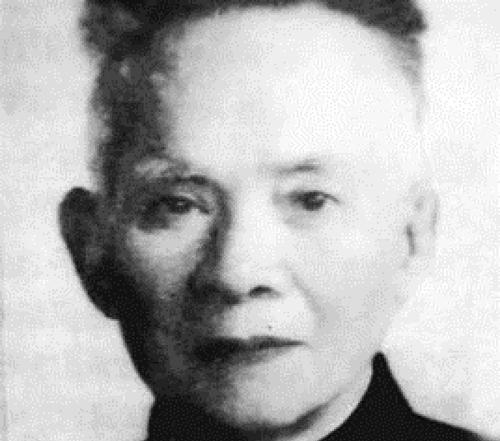In the Battle of Huaihai, the Kuomintang army killed two main corps commanders Huang Baitao and Qiu Qingquan, two army commanders Xiong Shouchun and Chen Zhang, and 550,000 officers and men were annihilated on the battlefield of Xu Beng. In order to eliminate the main force of the 7 corps of the Kuomintang Army, the People's Liberation Army also invested 660,000 regular troops in the Battle of Huaihai, paying a huge casualty price of more than 130,000 people (more than 20,000 of whom were killed in battle) before finally winning the victory. In the Battle of Huaihai, our army captured an enemy commander, who was the most stubborn Kuomintang commander during the entire Liberation War. This person was Liu Zhenxiang of the 64th Army of the Seventh Corps.

Liu Zhenxiang was born in 1906 and is a native of Guangdong. Although he was a student of the fifth term of Huangpu, in the early stages of his military career, Liu Zhenxiang was under the hands of Chen Jitang, a tycoon of the Cantonese army, who was known as the "Southern Heavenly King" when he was at the height of his power, threatening the Nanjing regime, but in 1936 this person was defeated by Lao Jiang, and Liu Zhenxiang was able to switch from Chen Jitang to Lao Jiang because of his former huangpu student origins, and gradually became reused. By the time of the victory of the War of Resistance Against Japanese Aggression, he had become the commander of the 156th Division of the 64th Army, which was mainly a Cantonese soldier, and was promoted to the commander of the 64th Army during the Liberation War. Liu Zhenxiang's fighting style was fierce and decisive, and although the troops under his command were poorly equipped, their combat effectiveness was very strong among the Kuomintang armies participating in the Huaihai Campaign.
During the three major battles, the Kuomintang Army had four corps with outstanding strength, namely the 2nd Corps, the 7th Corps, the 9th Corps, and the 12th Corps. Each of these corps had a strength of more than 100,000 troops, and Liu Zhenxiang's 64th Army was incorporated into Huang Baitao's 7th Corps. At the beginning of the Huaihai Campaign, due to the uprising in the Third Appeasement Area on the north side of the Yellow Corps, the road was made, allowing the main force of the People's Liberation Army to quickly encircle the Yellow Corps. In a hurry, Commander Huang Baitao ordered the armies to march quickly in the direction of Xuzhou City.
Liu Zhenxiang's 64th Army was one of the main forces of the 7th Corps, second only to the 25th Army of Huang Baitao's lineage, so it had a greater say among the various armies in the Corps. Dissatisfied with the status quo of being chased and beaten by Hua Ye, Liu Zhenxiang was the first to boldly propose a way of playing by sticking to the Xuzhou group such as Nianzhuang and other Xuzhou groups to come to the confluence, and no longer rushed west. Huang Baitao was also stubborn, and seeing that his subordinates proposed this plan, he ordered the corps to garrison the village in spite of the opposition of the people. Facts have proved that Liu Zhenxiang and Huang Baitao's wayward "no run" tactics directly led to the siege and annihilation of 100,000 troops.
The Battle of Nianzhuang in November 1948 was fought for half a month, with more than 60,000 casualties on both sides, making it the most tragic offensive and defensive battle in the Battle of Huaihai. In the end, the 200,000 reinforcements of the Xuzhou Group and the 120,000 men of huang wei's corps failed to arrive at Nianzhuang in time, and only Liu Zhenxiang's 64th Army was left on the side of the Kuomintang 7th Corps, who did not surrender and surrender his gun, and actually took the lead in rushing out of the military command post to engage in hand-to-hand combat with Huaye soldiers, which was extremely rare among senior Kuomintang generals. In fact, during the war, whether it is a military commander or a corps commander, there are tens of thousands of military powers in hand and strict protection, and it is not particularly difficult to save your life if you are greedy for life and afraid of death. Unfortunately, Liu Zhenxiang was bent on dying in battle but could not succeed in his quest for death, and was captured on the spot by our army before the battle, and began his transformation career.
During the period of detention at the Gongdelin Management Center after the war, most of the senior generals of the Nationalist Army, and even some big men with deeper seniority than Liu Zhenxiang, such as Du Yuming and Song Xilian, all admitted their mistakes and studied, and were released from prison early after the reform was completed. Liu Zhenxiang, however, refused to cooperate with the reform due to his violent and obedient personality, and even led a group of former Kuomintang officers to beat up The Japanese war criminals who were detained together. Until 1975, the man had been imprisoned for 27 years, and his name was still listed by the Ministry of Public Security on the list of "unpardonable" stubborn Kuomintang war criminals. If the unified release of all prisoners of war had not been carried out under the instructions of the central authorities, Liu Zhenxiang would most likely have died in Gongdelin. Eleven years after his release from prison, Liu Zhenxiang died of illness at the age of 80.